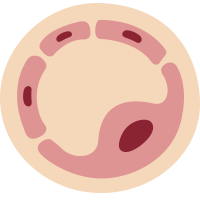
Endothelial Cell News
Endothelial Cell News is an online resource dedicated to the latest research studying the endothelium, blood vessels, and angiogenesis.
Artery Formation in the Intestinal Wall and Mesentery by Intestine-Derived Esm1+ Endothelial Cells
[Nature Communications] Scientists showed with genetic approaches that a small subpopulation of endothelial cells inside the intestinal villi of the embryonic mouse gives rise to arterial endothelium in the intestinal wall but also in the distant mesenteric vasculature.
Transdifferentiation of Endothelial Progenitor Cells into Rhabdomyosarcoma Defined by Hedgehog Signaling Competence
[Cell Reports] Using lineage tracing of embryonic endothelial progenitor cells and mature, adult endothelial cells, we show that a selected subset of endothelial progenitor cells can transform into rhabdomyosarcoma.
Stress-Induced Mitochondrial Fragmentation in Endothelial Cells Disrupts Blood-Retinal Barrier Integrity Causing Neurodegeneration
[Molecular Therapy] Researchers showed that ocular hypertension, a major risk factor to develop glaucoma, induced mitochondrial fragmentation in retinal capillary endothelial cells accompanied by increased oxidative stress and ultrastructural defects.
Targeting Endothelial ERG to Mitigate Vascular Regression in Retinopathies
[Proceedings of The National Academy of Sciences of The United States of America] Investigators developed a mouse model of inducible endothelial cell-specific overexpression of ETS-related gene and found it mitigates capillary regression, retinal neuron death, neovascularization, and visual defects in the retinopathy of prematurity model.
Identification of Lymphatic Vessels in Skull Periosteum but Not Bone Marrow Reveals Skull Channel Heterogeneity
[Journal of Experimental Medicine] Researchers used organ clearing, high-resolution three-dimensional imaging, cell type–specific mouse genetics, and surgical approaches to investigate skull vasculatures.
Old World Alphaviruses Use Distinct Mechanisms to Infect Brain Microvascular Endothelial Cells for Neuroinvasion
[Cell Reports] The authors investigated alphavirus-blood-brain barrier interactions by pairing a physiologically relevant, hPSC-derived model of brain microvascular endothelial-like cells with sindbis virus strains of opposite neuroinvasiveness.
A Noncanonical Role of Glycolytic Metabolites Controlling the Timing of Mouse Embryo Segmentation
[Science Advances] Scientists found that energetically subminimal amounts of glucose can support ongoing segmentation clock activity, providing evidence that glycolysis exerts a signaling function.
$3M grant seeks bioprinted solution for reconstructive surgery’s blood problem
[The Pennsylvania State University] With a new $3 million grant from the National Institutes of Health, researchers at Penn State are taking on this challenge by combining advanced 3D bioprinting with a novel surgical method, known as micropuncture.
NO-Driven Janus Nanomotor Enhances T Cell Infiltration by Reconstructing Tumor-Associated Blood and Lymphatic Vessels
[Advanced Science] Researchers introduced a multifunctional nitric oxide (NO)-driven hollow gold Janus nanomotor designed to promote tumor blood vessel normalization and increase T cell infiltration, thereby enhancing the immune response against tumors.
Ultrasound-Activated Piezoelectric Hydrogel Scaffold for Synergistic Immunomodulation and Angiogenesis in Accelerated Wound Healing
[Acta Biomaterialia] The authors demonstrated a spatiotemporally controllable approach to modulate the immune microenvironment of inflammatory wounds while promoting vascular regeneration, offering a clinically translatable strategy for regenerative medicine.
Leukocytes Use Endothelial Membrane Tunnels to Extravasate the Vasculature
[Cell Reports] Investigators showed that endothelial cells do not simply retract upon the passage of neutrophils but provide membrane tunnels, allowing neutrophils to extravasate.
Co-Therapy with S1P and Heparan Sulfate Derivatives to Restore Endothelial Glycocalyx and Combat Pro-Atherosclerotic Endothelial Dysfunction
[Life Sciences] Researchers introduced a new approach to regenerating the endothelila cell (EC) glycocalyx and restoring its function in ECs under disturbed flow conditions, offering a groundbreaking solution for preventing cardiovascular diseases like atherosclerosis.
Specific research topics covered in Endothelial Cell News include the roles of endothelial cells in the regulation of physiological processes, as well as their implications in tumor progression, cardiovascular disease, endometriosis, wound healing, tissue regeneration and other diseases and disorders. We also provide updates on the latest job postings and upcoming events, helping connect everyone within the endothelial cell research field.

 Cancer Stem Cell News
Cancer Stem Cell News Cell Therapy News
Cell Therapy News Dermal Cell News
Dermal Cell News Endothelial Cell News
Endothelial Cell News ESC & iPSC News
ESC & iPSC News Extracellular Matrix News
Extracellular Matrix News Hematopoiesis News
Hematopoiesis News Hepatic Cell News
Hepatic Cell News Human Immunology News
Human Immunology News Immune Regulation News
Immune Regulation News
 Intestinal Cell News
Intestinal Cell News Mammary Cell News
Mammary Cell News Mesenchymal Cell News
Mesenchymal Cell News Muscle Cell News
Muscle Cell News Neural Cell News
Neural Cell News Organoid News
Organoid News Pancreatic Cell News
Pancreatic Cell News Prostate Cell News
Prostate Cell News Pulmonary Cell News
Pulmonary Cell News
